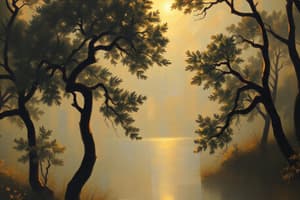Podcast
Questions and Answers
Which of the following is NOT one of the four Conventional Literary Genres?
Which of the following is NOT one of the four Conventional Literary Genres?
- Poem
- Drama
- Graphic Literature (correct)
- Science Fiction
Which literary genre typically includes elements such as imaginary worlds and magical occurrences?
Which literary genre typically includes elements such as imaginary worlds and magical occurrences?
- Drama
- Fantasy (correct)
- Epic
- Fable
In the context of 21st Century Literature, what best describes electronic literature?
In the context of 21st Century Literature, what best describes electronic literature?
- Literature created for printed media only.
- Narratives exclusively communicated through oral traditions.
- Works that require a computer or digital device to be experienced. (correct)
- Traditional stories that have been digitized.
Which type of literary composition is characterized by real events and factual accounts?
Which type of literary composition is characterized by real events and factual accounts?
Which statement best describes the genre of science fiction?
Which statement best describes the genre of science fiction?
Which of the following genres typically incorporates moral lessons and anthropomorphized animals?
Which of the following genres typically incorporates moral lessons and anthropomorphized animals?
What genre is characterized by a narrative that includes a heroic journey and explores themes of honor and valor?
What genre is characterized by a narrative that includes a heroic journey and explores themes of honor and valor?
In terms of genre classification, which of the following best defines works characterized by real experiences and factual content?
In terms of genre classification, which of the following best defines works characterized by real experiences and factual content?
Which type of genre is known for its use of visual storytelling often combined with text to convey narratives?
Which type of genre is known for its use of visual storytelling often combined with text to convey narratives?
Which of these options is a characteristic feature of New and Emerging Literary Genres?
Which of these options is a characteristic feature of New and Emerging Literary Genres?
Study Notes
Conventional Literary Genres
- Understand key characteristics of literary genres: Science Fiction, Drama, Fantasy, Fable, Poem, and Epic.
- Familiarize with traditional elements, such as plot structure, characterization, and themes specific to each genre.
Matching Author's Work with Genre
- Prepare to identify notable authors and their respective works within specified genres.
- Be aware of influential writers, such as classics in Science Fiction (e.g., Isaac Asimov), significant plays in Drama (e.g., Arthur Miller), and iconic Fantasy series (e.g., J.K. Rowling).
Literary Compositions: Fiction and Non-Fiction
- Fiction examples may include novels, short stories, novellas, or graphic novels.
- Non-fiction examples may include essays, biographies, memoirs, and journalistic pieces.
- Recognize the differences in purpose and style between these two categories.
Genre Review
- Revisit the key aspects of Genre Fiction, which typically includes narrative structure and character development.
- Explore New and Emerging Literary Genres, noting trends like autofiction and cli-fi (climate fiction).
- Understand Electronic Literature, focusing on narratives that exist in digital formats and interactivity.
- Review Graphic Literature, paying attention to the combination of visual images and text.
Conventional Literary Genres Enumeration
- Identify the four main Conventional Literary Genres: Fiction, Non-Fiction, Poetry, Drama.
- Types of Manga include Shonen (targeted towards boys), Shojo (targeted towards girls), Seinen (adult male), and Josei (adult female), each with distinct themes and storytelling styles.
Essay Component: Epigram Explanation
- An epigram is a brief, witty poem or saying that conveys a thought or observation.
- Explore the purpose of epigrams, often used for comedic or satirical effect, and prepare examples to illustrate your understanding.
Conventional Literary Genres
- Understand key characteristics of literary genres: Science Fiction, Drama, Fantasy, Fable, Poem, and Epic.
- Familiarize with traditional elements, such as plot structure, characterization, and themes specific to each genre.
Matching Author's Work with Genre
- Prepare to identify notable authors and their respective works within specified genres.
- Be aware of influential writers, such as classics in Science Fiction (e.g., Isaac Asimov), significant plays in Drama (e.g., Arthur Miller), and iconic Fantasy series (e.g., J.K. Rowling).
Literary Compositions: Fiction and Non-Fiction
- Fiction examples may include novels, short stories, novellas, or graphic novels.
- Non-fiction examples may include essays, biographies, memoirs, and journalistic pieces.
- Recognize the differences in purpose and style between these two categories.
Genre Review
- Revisit the key aspects of Genre Fiction, which typically includes narrative structure and character development.
- Explore New and Emerging Literary Genres, noting trends like autofiction and cli-fi (climate fiction).
- Understand Electronic Literature, focusing on narratives that exist in digital formats and interactivity.
- Review Graphic Literature, paying attention to the combination of visual images and text.
Conventional Literary Genres Enumeration
- Identify the four main Conventional Literary Genres: Fiction, Non-Fiction, Poetry, Drama.
- Types of Manga include Shonen (targeted towards boys), Shojo (targeted towards girls), Seinen (adult male), and Josei (adult female), each with distinct themes and storytelling styles.
Essay Component: Epigram Explanation
- An epigram is a brief, witty poem or saying that conveys a thought or observation.
- Explore the purpose of epigrams, often used for comedic or satirical effect, and prepare examples to illustrate your understanding.
Studying That Suits You
Use AI to generate personalized quizzes and flashcards to suit your learning preferences.
Description
Prepare for your midterm exam in 21st Century Literature with this comprehensive reviewer. Study the key points from the last presentation on Conventional Literary Genres, and practice matching authors with their respective genres such as Science Fiction, Drama, and Epic. Additionally, identify examples of literary compositions to solidify your understanding.




